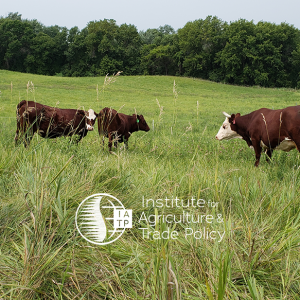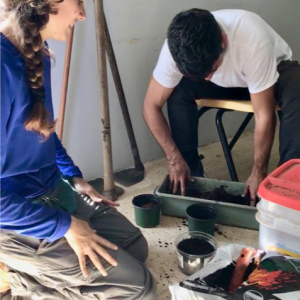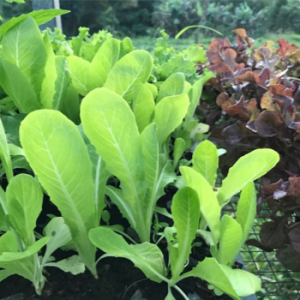If you remember back to the last farm bill reform activities, you may even remember Daryll Ray and his analysis around subsidies. Well, myths around subsidies being the root of all evil in the farming system persist even among groups such as Bread for the World. Granted the issue can seem complex and it’s easier to mimic what others say (I certainly confess to this sin), but Professor Ray has done a great job of explaining the real story. Thanks to Presbyterian farmer and advisor, Brad Wilson, we have resources on this topic below at the tip of your fingers. Thank you Brad!
And if you wish to learn from and join with Presbyterians discussing (and acting on!) similar topics, such as how folks are overhauling the food system with local and regional faith-based initiatives, you are welcome to join the PCUSA Food and Faith Groupsite. Just sign-up to join and you’ll soon be part of this growing group of Agrarian Allies!
Daryll Ray of the Agricultural Policy Analysis Center at the University of Tennessee has written many excellent materials on the farm bill, price floors, (“price supports,”) farm subsidies, supply management, and related topics.
Ray’s best summary of the topic is probably the Executive Summary to his (et al) 2003 report: “ Rethinking US Agricultural Policy: Changing Course to Secure Farmer Livelihoods Worldwide.”
Read more…
Read more »
 By Ahna Kruzic, Communications Director of Pesticides Action Network North America Original post Globally, today’s food and agriculture systems are responsible for more climate change-contributing emissions than the world’s cars, trucks, planes, and trains combined. At the same time, we’re confronted with evidence that climate change is wreaking havoc on agricultural production—and unraveling systems of… Read more »
By Ahna Kruzic, Communications Director of Pesticides Action Network North America Original post Globally, today’s food and agriculture systems are responsible for more climate change-contributing emissions than the world’s cars, trucks, planes, and trains combined. At the same time, we’re confronted with evidence that climate change is wreaking havoc on agricultural production—and unraveling systems of… Read more »
 By Ahna Kruzic, Communications Director of Pesticides Action Network North America Original post Globally, today’s food and agriculture systems are responsible for more climate change-contributing emissions than the world’s cars, trucks, planes, and trains combined. At the same time, we’re confronted with evidence that climate change is wreaking havoc on agricultural production—and unraveling systems of… Read more »
By Ahna Kruzic, Communications Director of Pesticides Action Network North America Original post Globally, today’s food and agriculture systems are responsible for more climate change-contributing emissions than the world’s cars, trucks, planes, and trains combined. At the same time, we’re confronted with evidence that climate change is wreaking havoc on agricultural production—and unraveling systems of… Read more »
 Iowa celebrated Cinco de Mayo with a unique speech by Senator Bernie Sanders and Iowan farmers who called for an agricultural and rural transformation. “This is a game changer, a key paradigm change for the Farm and Food Movement and beyond,” said Presbyterian Iowa farmer, Brad Wilson. The Des Moines Register article led with: U.S….
Iowa celebrated Cinco de Mayo with a unique speech by Senator Bernie Sanders and Iowan farmers who called for an agricultural and rural transformation. “This is a game changer, a key paradigm change for the Farm and Food Movement and beyond,” said Presbyterian Iowa farmer, Brad Wilson. The Des Moines Register article led with: U.S….  We’re winding down National Ag Week with this post on Agriculture and Climate. IATP provides a brief summary and some great resources below. And speaking of resources, you can download our Food and the Climate Crisis poster/placemat right here. Stay tuned for the launch of PHP’s Climate Challenge this summer! From the Institute for Agriculture…
We’re winding down National Ag Week with this post on Agriculture and Climate. IATP provides a brief summary and some great resources below. And speaking of resources, you can download our Food and the Climate Crisis poster/placemat right here. Stay tuned for the launch of PHP’s Climate Challenge this summer! From the Institute for Agriculture…  This is the second part of a two-part series on Puerto Rico, Climate Change and Food. Part one can be found here. “Back to the Land” and Agroecology Jesús Vázquez Negron and I visited Ian Pagán Roig at Finca (farm) Josco Bravo in Toa Alta, Puerto Rico, which is one of the three sites at…
This is the second part of a two-part series on Puerto Rico, Climate Change and Food. Part one can be found here. “Back to the Land” and Agroecology Jesús Vázquez Negron and I visited Ian Pagán Roig at Finca (farm) Josco Bravo in Toa Alta, Puerto Rico, which is one of the three sites at…  Overview In December, I participated in a delegation comprised of staff from Presbyterian Disaster Assistance (PDA), Presbyterian Self-Development of People (SDOP), and Special Offerings, and we invited local pastors and mid-council staff to join us for the visits to Fideicomiso de la Tierra, a decimated family farm in Lares, and Presbyterian Camp Guacio over the course of…
Overview In December, I participated in a delegation comprised of staff from Presbyterian Disaster Assistance (PDA), Presbyterian Self-Development of People (SDOP), and Special Offerings, and we invited local pastors and mid-council staff to join us for the visits to Fideicomiso de la Tierra, a decimated family farm in Lares, and Presbyterian Camp Guacio over the course of…  It does matter because “you are what you eat” is not an allegory; it is literally true. The substances that pass between your lips become your very own skin, muscle, cartilage, ligaments, nails, bones, blood, lymph and cerebral spinal fluid. Not to mention your organs, nerve cells and the two dozen digestive enzymes that break down food.
It does matter because “you are what you eat” is not an allegory; it is literally true. The substances that pass between your lips become your very own skin, muscle, cartilage, ligaments, nails, bones, blood, lymph and cerebral spinal fluid. Not to mention your organs, nerve cells and the two dozen digestive enzymes that break down food.